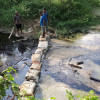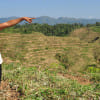Halda River at stake
The country's largest natural breeding ground for carp, Halda River, has been under threat owing to various manmade hazards, including industrial waste and sewage contamination, sand extraction and illegal fishing. The situation has gotten worse due to unprecedented tobacco farming near the ecologically sensitive river catchment area. A research shows that the amount of fish eggs laid in the river dropped down drastically to only 47 kg in 2015 from 5,000 kg in 1945.
In the last three years, tobacco farming has increased 50 folds in the area. Tobacco requires up to four times more fertiliser and pesticide than traditional crops. Excess amounts of fertiliser and pesticides wash down to the nearby river and seriously contaminate the fish spawning zone.
It is alleged that tobacco companies induce local farmers with various incentives to discontinue cultivation of traditional crops in favour of tobacco. The local administration seems quite oblivious of this alarming trend. Bangladesh is a signatory to the WHO Framework Convention on Tobacco Control (FCTC) which requires the government to take preventive steps to protect the environment from tobacco-related damage, by helping farmers grow alternative crops. Unfortunately there is little government campaign against tobacco production.
The government should immediately curb this menacing spread of tobacco farming near the Halda River. The farmers should be given incentives to grow alternative crops. Even then the nearby croplands should use organic fertiliser and pest control system. The river's hinterland should also be reforested.

 For all latest news, follow The Daily Star's Google News channel.
For all latest news, follow The Daily Star's Google News channel. 








Comments